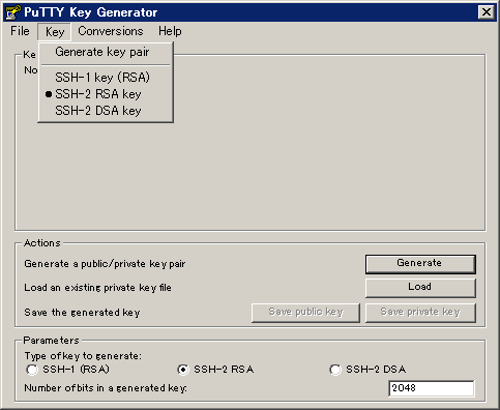Putty Generate Public Key From Private
Private Save the private key in the proprietary PuTTY key format as a.ppk file. Fingerprint Outputs the fingerprint of the key. The fingerprint uniquely identifies the key and can, for example, be read over the phone to ensure the key is the intended one. Public Save the public key corresponding. Under Actions / Generate a public/private key pair, click Generate. You will be instructed to move the mouse cursor around within the PuTTY Key Generator window as a randomizer to generate the private key. Once the key information appears, click Save private key under Actions / Save the generated key. Save the private key to the desktop as idrsa.ppk. Generate RSA keys with SSH by using PuTTYgen. Last updated on: 2016-06-23; Authored by: Rackspace Support; One effective way of securing SSH access to your cloud server is to use a public-private key pair. This means that a public key is placed on the server and a private key is placed on your local workstation. Using a key pair makes it.
The PuTTYgen program is part of PuTTY, an open source networking client for the Windows platform.
PuTTY doesn't support the SSH private key format created by the Oracle Cloud wizards, so you have to convert the private key to the PuTTY required format. To connect to a remote machine with PuTTY, your private key should have a ppk format. You cannot generate private key from public key but you can generate public key from the private key using puttygen. As @alfasin mentioned if you could generate the private key from public key then RSA would be useless and this would make you vulnerable to attack.FYI the public key is used for encryption and private key is used for decryption.


This guide describes how to generate and use a private/public key pair to log in to a remote system with SSH using PuTTY.PuTTY is an SSH client that is available for Windows and Linux (although it is more common on Windows systems). Nuxt generate application server key.
Putty Generate Public Key From Private School
- Download and install PuTTY or PuTTYgen.
To download PuTTY or PuTTYgen, go to http://www.putty.org/ and click the You can download PuTTY here link.
- Run the PuTTYgen program.
- Set the Type of key to generate option to SSH-2 RSA.
- In the Number of bits in a generated key box, enter 2048.
- Click Generate to generate a public/private key pair.
As the key is being generated, move the mouse around the blank area as directed.
- (Optional) Enter a passphrase for the private key in the Key passphrase box and reenter it in the Confirm passphrase box.
Note:
While a passphrase is not required, you should specify one as a security measure to protect the private key from unauthorized use. When you specify a passphrase, a user must enter the passphrase every time the private key is used.
- Click Save private key to save the private key to a file. To adhere to file-naming conventions, you should give the private key file an extension of
.ppk(PuTTY private key).Note:
The.ppkfile extension indicates that the private key is in PuTTY's proprietary format. You must use a key of this format when using PuTTY as your SSH client. It cannot be used with other SSH client tools. Refer to the PuTTY documentation to convert a private key in this format to a different format. - Select all of the characters in the Public key for pasting into OpenSSH authorized_keys file box.
Make sure you select all the characters, not just the ones you can see in the narrow window. If a scroll bar is next to the characters, you aren't seeing all the characters.
- Right-click somewhere in the selected text and select Copy from the menu.
- Open a text editor and paste the characters, just as you copied them. Start at the first character in the text editor, and do not insert any line breaks.
- Save the text file in the same folder where you saved the private key, using the
.pubextension to indicate that the file contains a public key. - If you or others are going to use an SSH client that requires the OpenSSH format for private keys (such as the
sshutility on Linux), export the private key:- On the Conversions menu, choose Export OpenSSH key.
- Save the private key in OpenSSH format in the same folder where you saved the private key in
.ppkformat, using an extension such as.opensshto indicate the file's content.